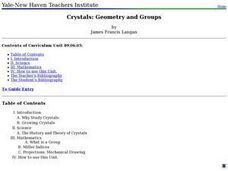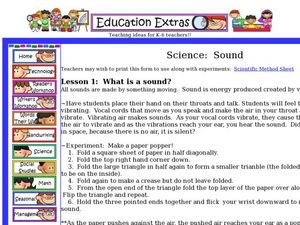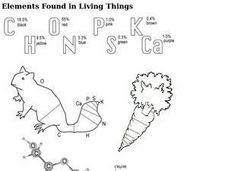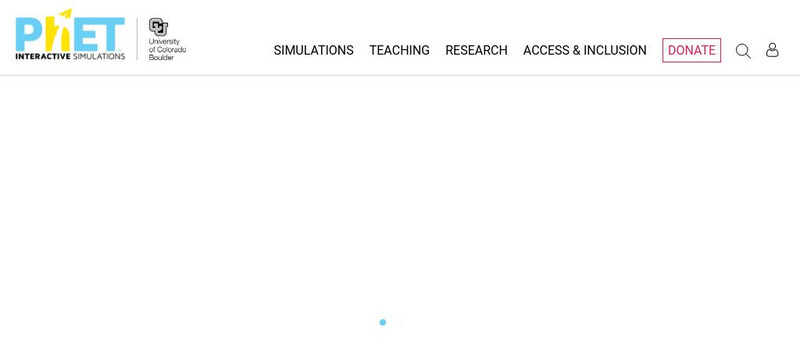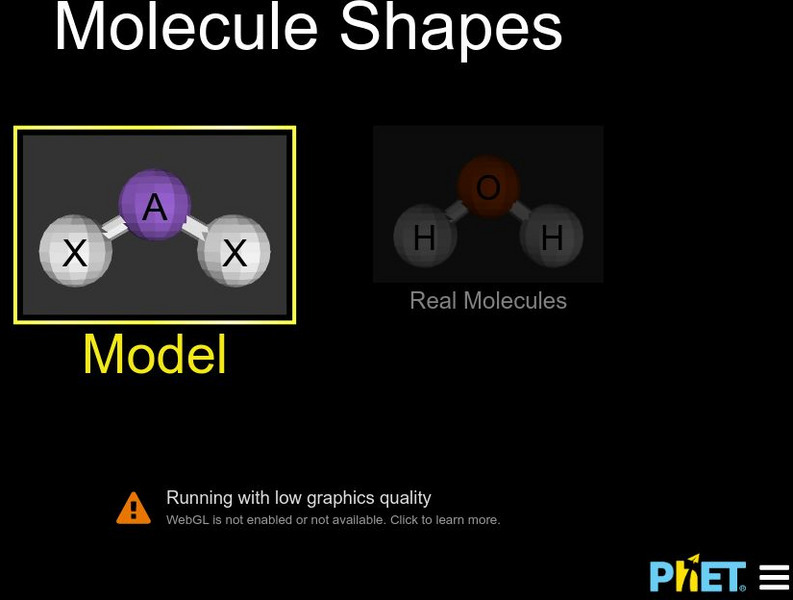Curated OER
Identifying Food Nutrients
Students pretend they are a food-quality tester. They develop a kit to test food for sugars, starches, proteins and lipids. They answer questions to complete the lesson plan.
Curated OER
Crystals: Geometry and Groups
Students discuss the importance of examining crystals and experiment growing them. In groups, they complete a project in which they use groups in geometry just like crystallographers. They practice solving the groups and proofs and...
Curated OER
DNA in a "Snap"
Students observe a model of DNA and answer probing questions like, "What does this model represent?" They then work in small groups to construct an accurate model of DNA per rubric provided and present to the class explaining their model...
Curated OER
Hierarchical Organization in Biology: Students Presentations of Neurobiology
Students gather (research) information on neuron structure and action potential. Students are guided to make inferences about the synapse and its relationship to neurotransmitter release and action. They are also guided to make...
Curated OER
A View of the Cell
For this cell worksheet, students will match 13 vocabulary words relating to cells to the correct definition. The cell vocabulary words cover all the parts of the cell plus eukaryotes, and prokaryotes.
Curated OER
Genetic Challenge Worksheet
In this genetics worksheet, students describe how to tell the difference between DNA, RNA, and proteins. Students also learn about the processes of transcription and translation. This worksheet has 3 short answer and 3 fill in the blank...
Curated OER
Chemiosmosis- The Mechanism of ATP Synthesis in Chloroplasts
In this chemiosmosis learning exercise, students trace the flow of protons and electrons through the thylakoid. Students also explain several key terms including in the reading passage provided.
Curated OER
Ozone Pollution: Smog Alert
Students examine factors the create smog. In this pollution lesson students complete an activity about ozone.
Curated OER
Resources for Teaching about Biogeochemical Cycles
Students study the different cycles and Earth's systems. In this investigative lesson plan students study the nitrogen and carbon cycles, play a game pertaining to it and also participate in a class activity.
Curated OER
What is a Sound?
Second graders explore the concept of sound. In this sound lesson, 2nd graders discover what sound, vibrations, and pitch are through several experiments. Students watch a Power Point presentation that allows them to complete a graphic...
Curated OER
A Model of a Scanning Tunneling Microscope
Ninth graders explain how a scanning tunneling microscope works. In this chemistry lesson, 9th graders construct atomic models and simulate how their images appear under the STM. They discuss the limitations of their atomic model.
Curated OER
Interpreting Chemical Formulas
For this chemical formulas worksheet, students practice naming molecular compounds by their formulas and determine if a gas is a compound or an element. This worksheet has 13 fill in the blank questions.
Curated OER
A Lab Trilogy for Beginning Biology Teachers
Young scholars are able to explain their models to other students and to their parents. Then young scholars like to decorate the room by hanging the models or constructing mobiles of a number of models.
Curated OER
Elements Found in Living Things
In this elements activity, students review the most common elements found in living things. Students color in two pictures with the percentages of the elements found in that living thing.
Curated OER
Cellular Respiration
In this cellular respiration worksheet, students compare the following processes: cellular respiration, glycolysis, lactic acid fermentation, and alcoholic fermentation. This worksheet has 9 short answer, 6 matching, 3 multiple choice,...
Curated OER
DNA Blueprint for Life
Students isolate DNA from different food sources. In this biology lesson, students research DNA extraction. They analyze DNA stands collected from the lab, and compare the differences between each.
Curated OER
DNA and RNA
Tenth graders research the history and discovery of DNA. Using their text, they label a basic DNA structure and the composition of genes. They explain how RNA and DNA differ from one other and discuss the processes of transcription and...
Curated OER
Doing Science: Computer Models
In this computer models worksheet, students read information about how scientists use computer models to advance the work of science. Students also answer a critical thinking question comparing computer simulations to direct observations.
Curated OER
Science: What Happens to Create the Lode?
Learners understand how mineral deposits are formed and why they are not evenly dispersed. They create and describe three different precipitates from four solutions simulating mineral ore deposit formation in sedimentary rock.
Curated OER
Biology: Protein Study
Students in pairs, select and view proteins from the Protein Data Bank. After downloading the tutorial and instructions, they identify the protein's structures and primary biological functions. Then, students present their findings to...
Curated OER
Super Scientists Bingo
In this science worksheet, students select twenty-five scientists from the list to fill in their bingo card. Then they match each of the scientists listed to their correct description strip.
University of Colorado
University of Colorado: Ph Et Interactive Simulations: Molecule Shapes
Explore molecule shapes by building molecules in 3D. How does molecule shape change with different numbers of bonds and electron pairs? Find out by adding single, double or triple bonds and lone pairs to the central atom. Then, compare...
University of Colorado
University of Colorado: Ph Et Interactive Simulations: Molecule Shapes: Basics
Explore molecule shapes by building molecules in 3D. Find out how a molecule's shape changes as you add atoms to a molecule.
University of Colorado
University of Colorado: Ph Et Interactive Simulations: Molecule Shapes
Build a molecule in 3-D. Add single, double, and triple bonds, or a lone pair of electrons to an atom, learn what the molecule's geometric name is, see the bond angles, and manipulate each molecule to view it from all sides. Then study a...



